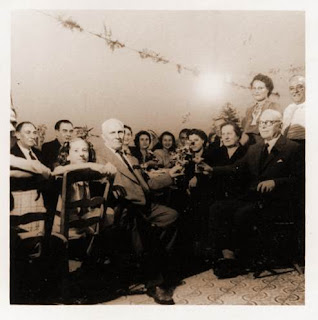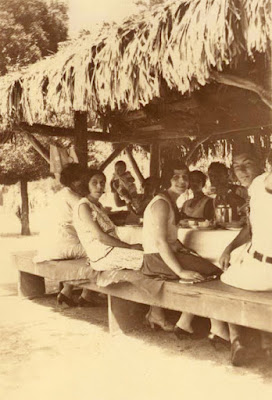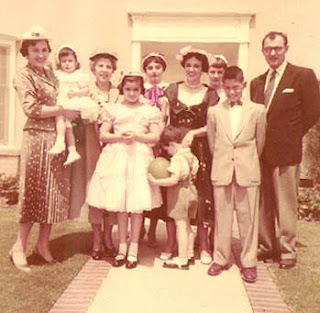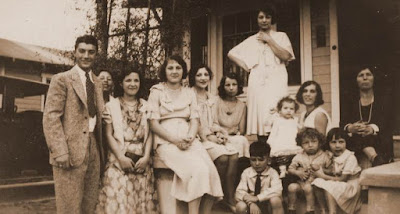We’re in a large family dining room. Around the table are my dad, and his parents, my grandmother and grandfather. Also there is my dad's sister and her husband, and my dad's uncles and aunts, wives and husbands. My mother’s mother is there as well as my mom's older sister and her two brothers and their wives.
The table is oval and large. It is covered with a white tablecloth, not too bright. There is an overhead light, a chandelier, but not too fussy. The light is warm, like that from a fireplace. There is opera music, not too tragic, playing, not too loud. Nothing is overplayed. Everything is just right.
Nearby, the kitchen emits archetypical aromas that came from an Italian-American kitchen in the 1950’s; onion, basil, roasted potatoes, olive oil, grated cheese, tomato sauce simmering, meatballs, warm bread, lamb roast. Somewhere in time and imagination it’s Easter. Easter of the immigrants.
In the kitchen, my mother is cooking. Not her mother or her mother in law, my grandmothers. No, they are sitting down, waiting. Everyone is waiting, even my father. He is displaying great patience. And his patience is about to be rewarded with a Feast for the Ages.
My mother has made fresh pasta, ribbons of egg-rich goodness. From a garden in the long-lost past, put-up tomatoes re-create the freshness of a once idyllic California summer.
And that is what everyone is waiting for. For the pasta to be ready. The roast is resting. The potatoes are nestling in the juice of the roast. The meatballs await, simmering in the sauce. The wine glasses, delicate little ones, etched gracefully with grapevines, are filled with wine from several decanters on the table. Red wine, from California and, if my uncle had anything to do with it, also from Italy.
My real-life memories from a table like this usually were more frenetic. People would be talking a little louder, maybe cutting up, telling a joke or two. But not this time. It is as if everyone is waiting for something or someone. And they are. They are waiting for my mother to bring her home-made pasta to the table.
…
My dad’s friend Mario, whom I worked for when I moved to Dallas, would tell me stories about the tables he sat around as a child and later as a young man. “We’d go out to Escondido to my uncle’s ranch. There were oranges, avocados and fresh vegetables. They’d roast a lamb, the wine would flow. Several people would bring instruments out of their cars, everyone played something or sang and we’d sit there until the sun would set behind the Pacific Ocean. God, how I miss those days,” Mario would tell me. “They’re all gone now. We were young and new to this country. We were filled with dreams and hope. We were becoming Americans, but we never forgot where we came from.”
We never forgot where we came from. Three generations later, it is all as if it had been a dream. My older sister still remembers. Maybe a cousin or two in California. I have pictures and the faintest of memories.
…
I remember once, when I was three or four, we were at my Aunt Mary and Uncle Lou’s house. Everyone was getting ready to go to a fair. It must have been in the springtime, for I remember the weather was perfect. I must have gone to the bathroom, maybe upstairs. For when I came out, the house was empty. Everyone was gone. Without me.
It probably was only ten or twenty minutes. But to me it seemed like an eternity. I remember crying, thinking that they didn’t want to take me. What had I done so wrong?
Eventually someone came back, I think it was my Aunt Mary, and fetched me. Aunt Mary, who did not suffer fools gladly, saw that I was upset. But she wouldn’t have any of my tears. “Let’s go, little one, everyone is waiting for you.” And off we went, to get ice cream and balloons, and to sit in the carousel and listen to the calliope music. A day in the life. All gone as well.
…
Back, to the dream around the oval table. After the pasta arrived and the lamb and potatoes and salad and wine were all finished, several people would go outside to smoke and to watch the magnolia tree drop flowers on the roses in the garden. Inside the phonograph played the Easter Hymn from Cavalleria Rusticana. In a corner Aunt Anna was crying softly; the music recalled some memory which evoked her emotions.
Inneggiamo, il Signor non è morto.
Ei fulgente ha dischiuso l'avel.
Inneggiamo al Signore risorto—
oggi asceso alla gloria del Ciel!
Easter as it once was. Easter as it never was. Easter as it never will be again. For all the immigrants are gone and once again, we are home, alone.
written by Alfonso Cevola limited rights reserved On the Wine Trail in Italy
wine blog + Italian wine blog + Italy W







